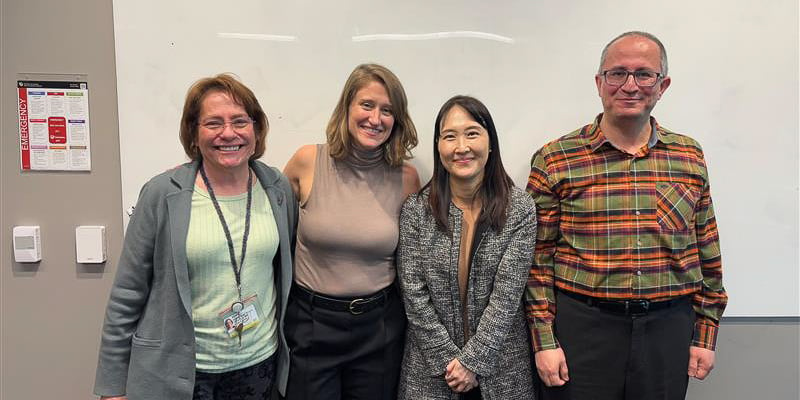Nursing and informatics are closely connected, with informatics offering nurses essential tools and technologies to enhance patient care, improve workflows, and support better decision-making. Using data, electronic health records, and clinical decision support systems, nursing informatics plays a key role in optimizing patient outcomes and promoting collaboration across healthcare teams.
At the Department of Biomedical Informatics (DBMI), we’re thrilled about the exciting intersection between informatics and nursing and the chance to collaborate with nurses across the country. At our January Bytes to Bedside seminar, we brought together our secondary faculty members from the University of Colorado College of Nursing (CU Nursing) to dive deeper into how their work incorporates informatics and uncover new opportunities for collaboration that will drive innovation in healthcare.
Revolutionizing Nursing Informatics Education
With their unique skill sets, these secondary faculty are also teaching the next generation of nursing informatics experts. Sharon Giarrizzo-Wilson, PhD, RN, CNOR, NI-BC, FAAN, assistant professor and specialty director in Health Care Informatics and Health Systems, shared how the Health Care Informatics Certificate program provides an opportunity for healthcare professionals, particularly those without a BS in Nursing, to acquire knowledge and skills in the rapidly progressing field of informatics.
Integrating Artificial Intelligence (AI) into the program is revolutionizing how students learn and engage with the field of informatics. As AI continues to evolve, incorporating it into the curriculum offers students a unique opportunity to understand and utilize cutting-edge technologies that are shaping the future of healthcare. To ensure a comprehensive learning experience, the program also invites guest speakers to address any gaps in knowledge, offering expertise from diverse areas of healthcare and informatics. These guest speakers provide students with real-world perspectives and practical insights, enriching their academic experience.
Additionally, students are given the opportunity to attend national conferences, where they can network with professionals from various sectors of healthcare, including government, startups, and established organizations. As part of this initiative, students also receive free memberships to the Healthcare Information and Management Systems Society (HIMSS), an important resource for informatics professionals. This membership allows students to access valuable industry insights and connects them with a global network of professionals, fostering collaboration and knowledge exchange.
Further, the program emphasizes hands-on informatics experience, giving students the chance to apply their learning in real-world settings. This practical approach equips them with the skills needed to navigate the complexities of healthcare systems and to drive improvements through data-driven decision-making. The program also actively seeks partnerships with CU campuses, guest faculty, and community organizations to expand the reach and impact of the educational experience. One such partnership is the collaboration with the Business track at the University of Colorado Boulder, which offers a healthcare analytics specialization. This collaboration provides students with access to additional expertise and training in the rapidly growing field of healthcare analytics, further preparing them for successful careers in informatics.
Through these initiatives, the program is fostering a dynamic, interdisciplinary approach to education that equips students with the tools and knowledge necessary to lead in the evolving field of healthcare informatics.
Meet the Nursing Faculty Driving Healthcare Innovation
Dawon Baik, PhD, RN
Dawon Baik, PhD, RN, assistant professor, is dedicated to developing technology-based behavioral health interventions that enhance self-management and quality of life for community-dwelling older adults with chronic diseases, as well as their family caregivers. Her research leverages digital health tools to address the unique challenges these populations face in managing health conditions and caregiving responsibilities. Baik's work focuses on three primary research areas: mobile health (mHealth) applications, digital health physical activity programs, and AI-powered caregiver assessments.
A key area of Baik's research involves developing mHealth applications to support self-care and symptom communication. She has contributed to the design and testing of apps for chronic disease patients, including those with heart failure and HIV. Baik is also refining a mHealth app to enhance social connectedness for older family caregivers, with a grant submission to the National Institute on Aging (NIA) in June. This app seeks to provide caregivers with tools to foster engagement and emotional support.
Baik is also leading the development of the TPA4You digital health physical activity program for older family caregivers of individuals with heart failure. This 12-week program combines Zoom coaching, fitness trackers, and personalized guidance to help caregivers achieve their physical activity goals. The program aims to improve physical function, sleep, and caregiving self-efficacy and reduce sedentary behavior, depression, anxiety, and stress.
Another significant aspect of Baik’s research is creating an AI-powered automated caregiver burden assessment tool. Using natural language processing (NLP)--based modeling, Baik's project aims to identify patterns of caregiver burden. The goal is to develop large language model (LLM)-based systems that can detect levels of burden in older family caregivers, providing a data-driven method to assess and address caregiver challenges.
In addition to her research, Baik teaches the foundations of healthcare informatics and serves as a committee member for comprehensive exams. Through her work, she is contributing to advancing digital health and its potential to improve the lives of older adults and their caregivers.
Christina Baker, PhD, NCSN, RN, NI-BC
Christina Baker, PhD, NCSN, RN, NI-BC, assistant professor of clinical teaching, brings a wealth of experience from her background in pediatric nursing in hospitals, outpatient clinics, informatics, and school nursing at Denver Public Schools and Children's Hospital Colorado ( CHCO). Her passion for improving healthcare access for students remains strong. As part of the Nursing Informatics Working Group (NIWG), she is contributing to a policy group focused on investigating state policies related to the legal aspects of AI in nursing.
While working as a school nurse, Baker encountered a significant challenge—a lack of access to student health records. This disconnect often resulted in suboptimal care for students with existing medical conditions. To address this, she conducted research at CHCO related to giving school nurses access to the Children's Colorado Connect instance of EPIC, which showed positive effects on children's health outcomes. She is leading efforts to ensure that school nurses throughout Colorado and the US can access electronic medical records through Health Information Exchanges.
Baker is actively building the necessary bridges for this data exchange. She’s researching a pilot project with school nurses in Delta, CO, who have access to the Quality Health Network (QHN) through a school-based health center (SBHC). Interviews and surveys with school nurses and medical providers will be conducted in February 2025, and the next step is to expand this groundbreaking project nationally.
Mustafa Ozkaynak, PhD
Mustafa Ozkaynak, PhD, associate professor, specializes in health systems engineering, with a focus on enhancing decision-making and care coordination in long-term care (LTC) and emergency settings. His research seeks to improve care quality and efficiency through advanced technologies and decision support systems, spanning areas like LTC, clinical decision support (CDS), refugee health, and emergency care coordination.
One of Ozkaynak’s key projects focuses on implementing decision support technologies in LTC settings. His goals include identifying the specific needs for effective decision support, implementing and evaluating two prototypes, and tracking their adaptations and impact in various LTC settings to improve patient outcomes and care delivery.
Another project aims to develop CDS systems that adapt to clinician fatigue, particularly in emergency departments (ED). This research examines how fatigue impacts clinical decisions and CDS use, particularly in managing outpatient antibiotic prescriptions. The goal is to create CDS guidelines that account for clinician fatigue, improving decision-making in high-pressure ED environments.
Ozkaynak also leads a project to improve healthcare adherence among refugee parents with children. The project investigates factors that hinder or support adherence to healthcare recommendations, like attending follow-up visits or filling prescriptions. He aims to create study instruments for a larger study and develop EHR chart abstraction tools to measure adherence, bridging healthcare access gaps for refugee families.
In emergency medicine, Ozkaynak is working on technologies to support care coordination across distributed emergency care teams. His work aims to design real-time coordination tools and evaluate their impact on prehospital care, ultimately improving patient outcomes and care timeliness.
Through his diverse research, Ozkaynak is advancing health systems engineering to improve healthcare delivery in LTC, emergency settings, and beyond, addressing key challenges such as clinician fatigue, refugee health, and care coordination.
Samantha Stonbraker, PhD, MPH, RN, FAAN
Samantha Stonbraker, PhD, MPH, RN, FAAN, assistant professor of nursing, is developing and evaluating digital interventions to improve HIV treatment and prevention for vulnerable populations. Her work occurs in "diverse multicultural and multilingual settings with limited resources," particularly focusing on safety net hospital systems and in healthcare clinics across the Dominican Republic.
Stonbraker's research highlights the significant HIV-related health disparities faced by Latinos, including higher prevalence, delays in diagnosis, faster disease progression, and higher mortality rates compared to white populations. In the Dominican Republic, these challenges are exacerbated by low economic status and health literacy, which hinder navigation of the healthcare system and communication with providers. To address these barriers, Stonbraker emphasizes the importance of culturally relevant, visually appealing infographics that are embedded into digital technologies to improve accessibility and usage across diverse settings locally and globally.
Stonbraker expanded her work to New York City, adapting the infographics for Latino PWH. A second pilot study with 30 participants included in-depth interviews in both English and Spanish, exploring their perspectives on infographic use. Building on the positive results, Stonbraker and her team conducted an implementation study across the Dominican Republic, where program-wide infographic use led to higher viral loads and more patient visits.
Stonbraker also integrated her infographics into a mobile app, "Info Viz for Health®," powered by Cliexa, which features interactive elements and language options. Designed to be provider-facing, the app adheres to SMART App standards for seamless integration with electronic health record (EHR) systems. Stonbraker is now working to integrate this app into EHR systems in the U.S., further expanding the reach and impact of her work.
In the past couple years, Stonbraker has expanded her program of research to include developing additional digital tools to enhance HIV prevention among marginalized populations. She is MPI of two NIMH-funded studies. One in which she and her colleagues are developing a tool to enhance recruitment and enrollment of marginalized people into HIV vaccine trials and another to enhance shared decision making about PrEP. She looks forward to partnering with other DBMI faculty to continue to expand her research portfolio to include AI and other technology-based interventions to improve health and health care in myriad settings.
To learn more, you can watch the full seminar here. Don't miss our upcoming DBMI events.






.png)
